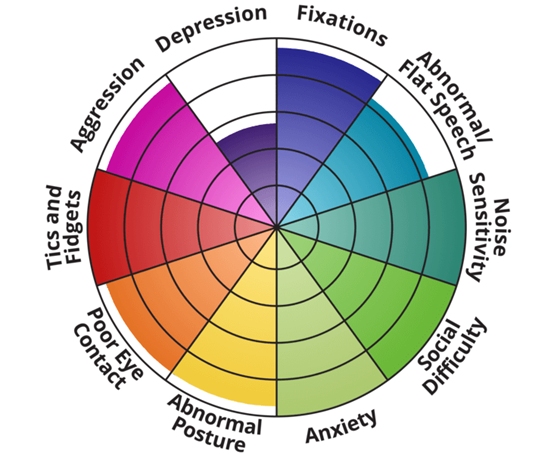Autism in the real world
Autism Spectrum Disorder (ASD) is a developmental disability caused by differences in the brain. People with ASD often have problems with social communication and interaction, and restricted or repetitive behaviours or interests. People with ASD may also have different ways of learning, moving, or paying attention.
We often hear about someone being spoken about as being ‘High’ or ‘Low’ functioning and being somewhere on the Autistic Spectrum. The truth is that the ‘spectrum’ isn’t a straight line as there are so many ‘indicators’, but is more like a circle. Something more complex like this:

Autism in and out of the Lodge
Autism is a condition that millions of people have learned to deal with as they live their lives at home and at work.
We should all understand how working with someone with ASD in the Lodge might best work. The first step is to determine someone’s condition and then to ascertain how best to work with them. This might mean avoiding certain situations and dealing with circumstances in a different way.
How can I tell if someone is Autistic?
Common signs of adult autism include:
- Finding it hard to understand what others are thinking or feeling.
- Getting very anxious about social situations.
- Finding it hard to make friends or preferring to be on your own.
- Seeming blunt, rude or not interested in others without meaning to.
- Finding it hard to express how they feel.
- Taking things very literally – for example, they may not understand sarcasm or phrases like “break a leg”.Having the same routine every day and getting very anxious if it changes.
- Trouble initiating conversation.
Other indicators might be a combination of:
- Losing interest quickly.
- Transitioning to a new topic of conversation.
- Inflexible behaviours.
- Trouble organizing or planning.
- Difficulty getting acclimatised to a new environment.
- Not understanding social “rules”, such as not talking over people
- Avoiding eye contact
- Getting uncomfortably close to people, or getting very upset if someone touches or gets too close to them.
- Noticing small details, patterns, smells or sounds that others do not.
- Having a very keen interest in certain subjects or activities.
- Liking to plan things carefully before doing them.
Do bear in mind that someone who is Autistic may well have learned to hide the signs of their autism to ‘fit in’ – by copying the mannerisms of people who don’t have autism.
It’s not all negative though. People with Autism often exhibit positive, valuable traits.
Positive traits of autism
- Autistic people are extremely passionate about what interests them. An attribute that translates to hyper-focusing and obsessively researching those interests until they have a deep understanding of the subject matter. They often have a wide variety of interests.
- They are straightforward, direct and honest. They mean what they say and aren’t afraid to tell you what they truly think.
- Autistic people perceive the world differently and process information in unique ways. As a result, they are independent and creative thinkers.
- They are detail-oriented and they pay attention to the finer details that others often miss. For example, an autistic man recently pointed out that all four seasons are six letters long: winter, spring, summer and autumn. II hadn’t noticed that!
- They love routine and will happily maintain those routines with great success.
- People with autism often have a great memory and an amazing ability to recall facts.
- Autistic people also tend to be visual thinkers. As a result, they can visualize solutions to problems, as well as other things, better than most people can.
- They follow their own unique set of social rules, which means they are often non-judgemental, don’t bully people or get easily swayed by peer pressure. They don’t feel the pressure to fit in like most people do.
- Autistic people are smart. Many have above-average intelligence. Yes, even preverbal or non-verbal autistic people!
- Autistic people aren’t afraid to be themselves. They’re unique and quirky, and don’t get bothered by what other people think of them. They just continue to be the unique individual they are by embracing and sharing their passions with the world.
![]()
